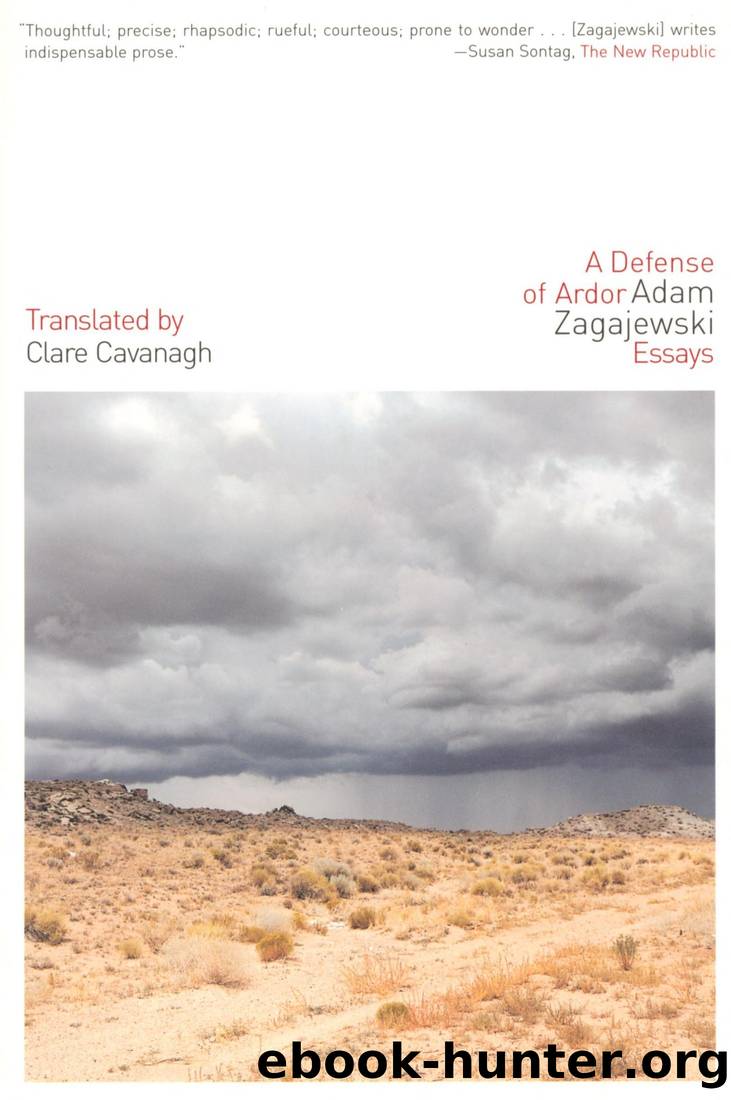A Defense of Ardor: Essays by Adam Zagajewski

Author:Adam Zagajewski
Language: eng
Format: azw3
Tags: Essays, Literary Criticism, Literary Collections, Poetry
ISBN: 9781466884236
Publisher: Farrar, Straus and Giroux
Published: 2004-09-28T23:00:00+00:00
5 Beginning to Remember
Beginning to remember! While the person we know and admire is still aliveâeven if he lives far offâremembering remains peaceful, lazy, and pointillist. The memory doesnât yet strive for a synthetic, unified vision. It calmly drifts from spot to spot; it skips from one episode to another like children playing hopscotch. We say: But do you remember the trip to Meaux? Do you remember Christmas Eve in Berlin, Zbigniewâs bass voice singing carols? Do you remember the visit to the Hôpital Saint-Louis? Do you remember the bouquet he brought you that time?
After the personâs death, everything changes. The memory grows sober and settles down to its great labor. This time its goal is synthesis. It longs to catch and combine all the scraps and pieces it recalls, along with the thoughts they inspired, into a single portrait. In the first weeks and months after the loss of a great friend the memory repeats: itâs still too soon, I still canât see, letâs wait a bit. But then the first anniversary of the death draws near, time swims past like an Olympic freestyler and suddenly you have to hurry, suddenly it seems that no task is more pressing. And at the same time it turns out that weâre dealing with an unfinished project, with a process of remembering that canât be seen through to its conclusion. Of course, you can write down some recollections, reach the words âthe end,â send the text off to the printerâonly to realize a few days later that youâve forgotten something, left something out. Often the most important thing! And so on, and so on.
It also turns out that we have at least two kinds of memory. One is intelligent, educated, not only able but eager to synthesize; this is the memory that sets forth large outlines, rational theses, vivid colors. But thereâs also her humbler sister, the memory of little snapshots, fleeting instants, a single-use camera producing atoms of recollection, which are not only unsuitable for enlargement and standardization, but even take pride in their absolutely idiomatic nature. And it is this memoryâsmall, quick, acuteâthat refuses death, will not agree to alter completely its system for archiving recollections. And thanks to this, it retains more life, more freshness in its flashes. It keeps repeating: remember, remember, remember ⦠and after each ârememberâ another slide from its vast repository lights up. Itâs useless, though, to request a specific moment, a specific day. This memory is as capricious as a librarian who thinks her paycheck is a disgrace and takes her revenge on innocent supplicants by pulling from the files only those photos that strike her fancy.
The mystery that every powerful personality conceals doesnât open up before us simply because the person who bore that mystery is no longer living. We saw the greatness of the person who died during his lifetime. We also saw his weaknesses and didnât dare to link them with his virtues, or perhaps we didnât know how. Now, when
Download
This site does not store any files on its server. We only index and link to content provided by other sites. Please contact the content providers to delete copyright contents if any and email us, we'll remove relevant links or contents immediately.
The Power of Myth by Joseph Campbell & Bill Moyers(1038)
Half Moon Bay by Jonathan Kellerman & Jesse Kellerman(969)
A Social History of the Media by Peter Burke & Peter Burke(962)
Inseparable by Emma Donoghue(954)
The Nets of Modernism: Henry James, Virginia Woolf, James Joyce, and Sigmund Freud by Maud Ellmann(872)
The Spike by Mark Humphries;(789)
The Complete Correspondence 1928-1940 by Theodor W. Adorno & Walter Benjamin(766)
A Theory of Narrative Drawing by Simon Grennan(760)
Culture by Terry Eagleton(756)
Ideology by Eagleton Terry;(719)
World Philology by(702)
Farnsworth's Classical English Rhetoric by Ward Farnsworth(695)
Bodies from the Library 3 by Tony Medawar(690)
Game of Thrones and Philosophy by William Irwin(689)
High Albania by M. Edith Durham(678)
Adam Smith by Jonathan Conlin(673)
A Reader’s Companion to J. D. Salinger’s The Catcher in the Rye by Peter Beidler(664)
Comic Genius: Portraits of Funny People by(632)
Monkey King by Wu Cheng'en(628)
